Update- March 29, 2022
The Government of Canada has announced special funding, in the form of supplements to existing research grants, that will provide relief and assistance to research trainees from Ukraine.
The Special Response Fund for Trainees (Ukraine) is administered by Canada’s three federal research funding agencies – the Canadian Institutes of Health Research (CIHR), the Natural Sciences and Engineering Research Council (NSERC) and the Social Sciences and Humanities Research Council (SSHRC) – and provides support to graduate students and postdoctoral researchers directly impacted by the Russian regime’s invasion of Ukraine.
Eligibility (HQP): Specifically, this temporary funding will help trainees currently in Canada who were expected to return to Ukraine in 2022 but cannot due to the current crisis, as well as trainees currently in Ukraine who wish to continue their planned studies and research in Canada.
Eligibility (Faculty Researchers): Active and eligible grant-holders can apply for this special supplement by completing and submitting a short application form.
Amount: The fund will allow up to $20,000 for the master’s level, $25,000 for the doctoral level and up to $45,000 for the postdoctoral level and will be in the form of supplements for salaries and stipends that may extend for up to one year.
Deadlines: Applications will be accepted using a continuous intake up to December 22, 2022.
For further information on the Special Response Fund for Trainees (Ukraine), visit:
- CIHR’s webpage
- NSERC’s webpage
- SSHRC’s webpage – Special Response Fund for Trainees (Ukraine).
- Western University webpage
- Frequently Asked Questions
—————————————————
CIHR, NSERC and SSHRC have announced a new Special Response Fund for Trainees (Ukraine). This temporary fund will allow all active and eligible grant-holders across the three agencies to apply for a supplement that will provide one-year relief and assistance to trainees (i.e., individuals eligible for master’s, doctoral or postdoctoral support) whose research in Ukraine has been interrupted by the invasion. Additionally, it enables grant-holders to retain research trainees who were expected to return to Ukraine in 2022 but cannot because of the current situation.
This special Fund will be in effect until the end of 2022, subject to review based on the evolving situation. The design of the Fund leverages past pilot projects to support refugees stationed at Canadian research institutions, such as training awards launched by CIHR in partnership with the International Development Research Centre, in 2016. Further details of the Fund will be released in the coming weeks, with information made available on the respective agency websites.
Going forward, the agencies commit to refraining from entering into agreements with Russian research institutions. Recognizing the value of open science, and the historic role many scientists, academics and researchers have played in defending freedom from tyranny, there will be no broad-based ban on collaborations with individual Russian researchers. However, they will work with Canada’s research institutions to ensure that no new collaborations with individual Russian researchers are established in areas that advance the interests of Vladimir Putin’s regime. NSERC will also ask grant-holders to suspend current, and prohibit future, federally funded research collaborations involving Russian industry, effective immediately.

